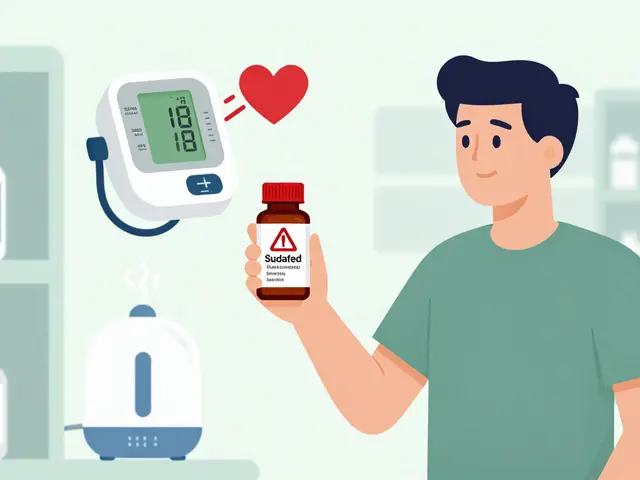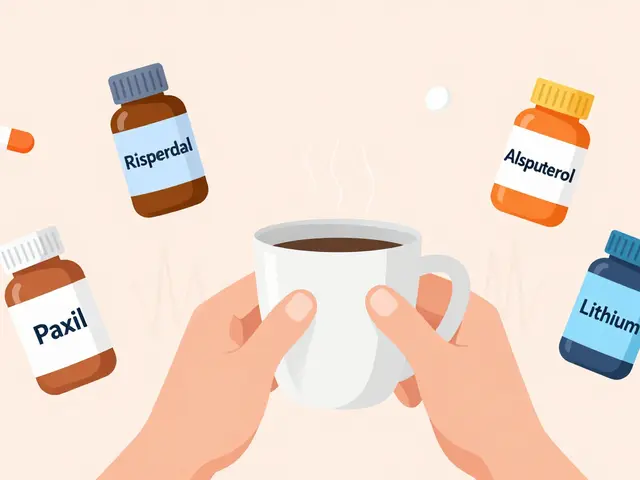
Your thyroid isn’t just about weight or energy—this little gland can actually mess with your heartbeat, big time. It pumps out hormones that help control how fast or slow your heart goes. If it gets out of whack, your heart can suddenly race, skip beats, or drag along like it’s stuck in mud.
Ever had a pounding heart for no reason, felt dizzy out of nowhere, or noticed your heartbeat jump around when you’re just sitting still? Don’t just brush it off. These could be signs your thyroid and your heart aren’t playing nice together. For some people, finding this connection early can make a huge difference.
- The Thyroid-Heart Link
- How Thyroid Disorders Mess with Heart Rhythm
- Spotting the Signs: Symptoms You Can Notice
- Risks and Long-Term Problems
- How Doctors Test and Diagnose
- What You Can Do: Managing Both Conditions
The Thyroid-Heart Link
Your thyroid may be small, but it packs a punch. It sits at the base of your neck and produces hormones that tell your body how fast things should run—including your heart. When your thyroid doesn’t work right, it often shows up first in your heart rhythm.
So, what’s really going on? Those thyroid hormones (mainly T3 and T4) act like the gas and brakes for your heart. Too much hormone puts your heart in overdrive; too little makes it sluggish. It turns out, your heart really listens to what your thyroid says.
Here’s a simple rundown of how this works:
- With hyperthyroidism (overactive thyroid), your body cranks out too much hormone, and your heart speeds up. That can cause palpitations, or even serious arrhythmias like atrial fibrillation.
- With hypothyroidism (underactive thyroid), you don’t get enough hormone. Your heart rate slows, and your heartbeats can become irregular or weak.
Check out these numbers: around 10% of people with hyperthyroidism will get atrial fibrillation—a type of arrhythmia where the heart beats fast and out of sync. This isn’t just something that happens to older folks, either. Young and otherwise healthy people can see these effects when their thyroid is off.
| Thyroid Condition | Common Heart Effect |
|---|---|
| Hyperthyroidism | Fast heartbeat, palpitations, atrial fibrillation |
| Hypothyroidism | Slow heartbeat, irregular pulse |
This is why doctors take your pulse and ask about symptoms if you have a thyroid problem. Sometimes, feeling your heart skip or flutter is the first real clue that your hormones need checking. If your heartbeat suddenly changes, or you feel weird chest sensations, it’s a sign to get your thyroid and heart checked together.
How Thyroid Disorders Mess with Heart Rhythm
The thyroid has one job: make hormones that help run your body’s engine. But crank out too much or too little, and the heart can get thrown off. Your heartbeat isn’t just some background noise; it’s tightly tied to what your thyroid is doing.
With hyperthyroidism (when your thyroid is in overdrive), your body ends up with too much thyroid hormone. This speeds up almost everything, including your heart rhythm. You might experience:
- Rapid or pounding heartbeat (doctors call this tachycardia)
- Extra or skipped beats (palpitations)
- Atrial fibrillation – a weird, chaotic rhythm that boosts stroke risk, especially in people over 60
On the flip side, hypothyroidism (a sluggish thyroid) slows everything down. Your heart can’t keep up, leading to:
- Slower heart rate (bradycardia)
- Fatigue and shortness of breath
- Heart feels "slow" or weak during physical activity
Why does this happen? Because thyroid hormones tell your heart when to speed up and when to chill out. With too many hormones, the heart races. With too few, it slows and gets lazy. It’s like someone messing with your car’s gas pedal and brakes—things just don’t run smoothly.
| Thyroid Condition | Common Arrhythmias | Extra Risks |
|---|---|---|
| Hyperthyroidism | Tachycardia, Atrial fibrillation | Blood clots, Stroke |
| Hypothyroidism | Bradycardia | Heart failure, High cholesterol |
If you know your thyroid is acting up, don’t ignore new heart symptoms. The two conditions really do fuel each other. Spotting this early can stop bigger heart troubles down the road.
Spotting the Signs: Symptoms You Can Notice
If your thyroid is out of balance, your body knows it—and your heart often gives the first clue. People with thyroid troubles notice weird things happening to their heart rhythm. Think heart palpitations, your heart pounding in your chest, or feeling like it’s skipping a beat. These aren’t just flukes; they're classic signs your thyroid and heart are having communication issues.
With an overactive thyroid (hyperthyroidism), you’ll often see:
- Racing heart (even when you’re chilling on the couch)
- Irregular heartbeat or a flutter, also called atrial fibrillation
- Shortness of breath
- Shakiness or sweating for no reason
- Trouble sleeping due to that thumping chest
An underactive thyroid (hypothyroidism) brings a different set of issues:
- Slow or weak pulse
- Constant tiredness (more than just a bad night’s sleep)
- Feeling cold or having cold hands and feet
- Mild swelling in hands, legs, or around the eyes
Here’s a quick way to spot the difference between typical arrhythmias and ones linked to thyroid problems: if you notice symptoms pop up along with weight changes (lost or gained a lot without trying), mood swings, or changes in skin and hair, the issue might be more than just your heart.
| Possible Symptom | Hyperthyroidism | Hypothyroidism |
|---|---|---|
| Fast or Irregular Heartbeat | ✓ | |
| Slow Heartbeat | ✓ | |
| Fatigue | ✓ | ✓ |
| Panic or Anxiety | ✓ |
If you’re dealing with several of these symptoms—especially weird heart stuff plus changes in energy, weight, or mood—it’s a good idea to ask your doctor about checking your thyroid as well as your heart. People often blame stress or caffeine, but the fix could be sorting out your thyroid instead.

Risks and Long-Term Problems
Ignoring thyroid issues when you’ve also got arrhythmias can lead to some pretty nasty problems that don’t just go away with time. The most common risk is atrial fibrillation—basically, your heart’s upper chambers beat all out of sync, which can triple your risk of stroke if you leave it unchecked. That’s not something anyone wants to play around with.
People with untreated hyperthyroidism (high thyroid hormone) often end up dealing with fast, irregular heartbeats. Over time, that speedy heartbeat can wear out your heart, leading to things like heart failure. On the flip side, hypothyroidism (low thyroid hormone) slows the heart way down, which might make you feel tired but can also cause high blood pressure and even raise cholesterol, setting the stage for heart attacks.
Here’s the uncomfortable truth—mixing thyroid issues and arrhythmias puts stress on the heart that builds up. If you don’t treat both, you could be dealing with:
- Higher risk of stroke (especially with atrial fibrillation)
- Heart failure due to long-term strain
- Blood clots forming in your heart
- Worsening high blood pressure and cholesterol
- More severe or frequent heart rhythm problems
Here’s a snapshot from some recent research that sums things up:
| Condition | Increased Risk (Compared to General Population) |
|---|---|
| Atrial Fibrillation with Hyperthyroidism | 5x higher risk of stroke |
| Hypothyroidism with Bradycardia | 2x risk of heart failure |
The bottom line? When the thyroid messes with your heart rhythm, it’s not just annoying or uncomfortable—it’s seriously risky long-term. This is why doctors take even mild symptoms seriously and why managing both issues is a must if you want to avoid bigger problems down the line.
How Doctors Test and Diagnose
When your heartbeat goes off script and you’ve got a history of thyroid trouble, doctors won’t play guessing games. They’ll run a mix of thyroid and arrhythmias tests to figure out what’s really behind those weird heartbeats.
The first thing they usually check? Blood tests. These look at your thyroid hormones—mainly TSH, T4, and T3. If these numbers are out of line, it’s a big clue your thyroid could be behind your heart issues.
- TSH (Thyroid Stimulating Hormone): High TSH could mean your thyroid is slacking (hypothyroidism), while low TSH might mean it’s overactive (hyperthyroidism).
- T4 and T3: If these are high, your body is flooded with thyroid hormone. If they’re low, you might not have enough.
If your bloodwork screams thyroid problems, doctors usually check your heart’s rhythm too. Here’s what’s common:
- ECG or EKG: This quick, painless test tracks your heart’s electrical signals. It catches skipped beats, fast rhythms, and slowdowns in action.
- Holter monitor: You wear this portable device for 24-48 hours so doctors can catch any weird rhythms that happen randomly during your normal day.
- Event monitors: Similar to a Holter, but you can wear these longer—sometimes weeks. Handy if your symptoms don't happen every day.
If something’s still not clear, they might do an ultrasound of your thyroid (called a thyroid ultrasound) or order more advanced heart tests.
| Test | What It Detects |
|---|---|
| Blood panel (TSH, T4, T3) | Thyroid hormone problems |
| ECG/EKG | Abnormal heart rhythm or arrhythmias |
| Holter/Monitor | Intermittent rhythm changes over days |
| Thyroid ultrasound | Nodules, swelling, structural changes |
If you’re having weird symptoms, keeping a log of when your heart feels off—plus anything else going on with your health—can really help your doctor connect the dots faster. The goal? Pin down if it’s really your thyroid shaking things up, your heart itself, or both.
What You Can Do: Managing Both Conditions
So, your doctor tells you that your thyroid is acting up, and your heart rhythm is off. Now what? Good news—you’re not stuck just waiting for things to get worse. There's actually a lot you can do to put yourself back in the driver's seat.
First off, make sure your doctor knows about every symptom, even the weird little ones. Being honest about things like feeling shaky, losing weight without trying, or having a fluttery heart can help your doctor get the full picture. Don't just focus on the heart or the thyroid—talk about both.
- If you have hyperthyroidism (an overactive thyroid), your doctor might try medication that slows down your thyroid and, in turn, your heartbeat. Sometimes, beta-blockers are used to calm a racing heart.
- If you have hypothyroidism (an underactive thyroid), you'll probably get a daily pill called levothyroxine to boost those hormone levels. This can help your heart find its rhythm again.
- Sticking to your medication schedule matters a lot—missing doses can throw everything off and make you feel worse.
Your daily routine matters, too. Here are some game-changers:
- Keep tabs on your heart rhythm. Smartwatches or even manual checks can tip you off if things are off again.
- Get a thyroid test at least once a year—or more often if your doctor says so. Stuff can change without much warning.
- Limit caffeine—too much can make arrhythmias and thyroid symptoms worse.
- Eat a balanced diet. Not fancy, just basics: lean protein, fruit, veggies, whole grains. Too much or too little iodine can mess with your thyroid, so check with your doc before starting supplements.
- Try to keep stress low. Realistically, this means do what works for you: walking, a hobby, or just unplugging for a bit every day.
Here’s a quick look at how common different arrhythmias are in people with thyroid trouble:
| Thyroid Disorder | Rate of Arrhythmias | Most Common Arrhythmia |
|---|---|---|
| Hyperthyroidism | 10-25% | Atrial fibrillation |
| Hypothyroidism | 3-8% | Bradycardia (slow heart rate) |
If things aren't getting better, or if you get new symptoms like chest pain or passing out, don’t wait—call your doctor or go to urgent care. Both thyroid problems and arrhythmias can get serious fast if you don’t stay on top of them.
11 Comments
Matt Laferty
July 20, 2025 AT 00:38 AM
Absolutely agree with the point about the thyroid’s impact on heart rhythm. As someone who’s spent years delving into cardio-endocrine interactions, I can attest to the fact that the thyroid gland’s hormones T3 and T4 have profound effects on cardiac electrophysiology. Sometimes, the signs are subtle — palpitations might be dismissed as anxiety when the thyroid is actually the culprit.
The article’s real-life examples help bridge the gap between abstract medical concepts and everyday experience. That said, I’d emphasize the importance of early screening, particularly for patients with risk factors like autoimmune conditions.
One surprising fact I'd add: even mild fluctuations in thyroid levels can lead to significant electrical disturbances in the heart, increasing risks of arrhythmia-related complications. So awareness and regular monitoring are critical!
Johnna Sutton
July 21, 2025 AT 14:24 PM
rly?? this whole thyroid thing affecting heart beats? sounds like another attempt from pharmaceutical giants to scare ppl into buying meds!!!! like how many ppl actually get checked for thyroid problems? and dont even get me started on how they keep slipping these theories in to control us!
i smell major coverup here, heart arrhythmias have been around for ages, now suddenly the thyroid is the villain?? where’s the real proof? u think doctoring papers exist for patients or the public? Nooo way!!! i bet this is just for shoving unnecessary tests down your throat and making you paranoid.
Anyone else feels like this is a massive racket?? Stay woke folks, don’t get played by the system trying to milk our fears!
Cassidy Strong
July 23, 2025 AT 06:58 AM
While I appreciate attempts to simplify complex medical issues, I must point out that this text suffers from loose punctuation and awkward phrasing throughout, which undermines its credibility. For example, "thyroid problems can mess with your heartbeat in ways most people don't realize" is far too colloquial. A more precise statement would clarify the physiological mechanisms involved.
Moreover, the use of phrases such as "No jargon, just clear info you can actually use" feels patronizing and informal for a topic of such seriousness. In discussions of arrhythmias linked to thyroid dysfunction, accuracy and clarity should take precedence over casual rhetoric.
It would benefit readers if the article adopted a more rigorous tone, with correct sentence structure and proper commas. These enhancements would lend the content greater authority.
Genie Herron
July 24, 2025 AT 23:31 PM
This article hits close to home, really. I’ve been dealing with unexplained heart palpitations for years, and finally got diagnosed with a thyroid issue. It's wild how something that seems unrelated can mess so much with your life.
Reading the tips and signs is comforting though—makes me feel like I’m not crazy and that I can take better control. But honestly, it’s scary to think how many people ignore these symptoms or think it’s stress or anxiety.
Thanks for breaking it down in a way that’s easy to understand. Articles like this help people feel less alone and more empowered to seek help.
Millsaps Mcquiston
July 26, 2025 AT 16:05 PM
Thumbs up to the author for keeping things straightforward. This is info people need to know, especially since heart health is a real concern in our country where medical awareness sometimes lags behind.
It’s crucial for folks to realize that signs like irregular heartbeat shouldn’t just be brushed off. Even if you feel fine, your thyroid might be playing tricks behind the scenes.
I hope this sparks more conversations about regular checkups and health literacy. Prevention beats treatment every day.
Suresh Pothuri
July 28, 2025 AT 08:38 AM
This article is definitely on point, but I’d like to highlight the importance of awareness in nations like mine. Often, thyroid-related arrhythmias are underdiagnosed due to lack of screening programs and public knowledge.
The physiological basis here is straightforward: thyroid hormones regulate metabolism, which affects cardiac pacing cells, potentially causing irregular heartbeats. The sooner we understand and detect these links, the better patient outcomes we’ll achieve.
That said, the piece could delve deeper into preventative measures beyond just symptoms. Education campaigns and accessible testing are critical.
Dave Tu
July 30, 2025 AT 01:12 AM
While the article is accessible, I find it lacks critical analysis of the evidence underpinning the thyroid-arrhythmia connection. Numerous studies have conflicting data about the extent to which mild thyroid dysfunction actually provokes significant arrhythmias in the general population.
One must be cautious not to overstate these correlations and risk causing unnecessary anxiety. Additionally, cardiovascular risk is multifactorial, and focusing heavily on thyroid status may misdirect attention from more prevalent causes like hypertension or coronary artery disease.
More detailed discussion of differential diagnoses and guideline-recommended diagnostic pathways would improve the utility of this piece.
Anil Karwal
July 31, 2025 AT 17:45 PM
I thought this was a decent primer. Personally, I like how it stays concise and not overwhelming with medical jargon. That’s important for everyday readers who want to get clear facts quickly without wading through complex terminology.
That said, I’d be curious if the author could expand on how medication or treatment for thyroid issues specifically influences arrhythmia risks—does fixing thyroid levels reliably reverse abnormal heart rhythms in most cases?
Some more nuance on treatment outcomes would be a useful follow-up.
michael klinger
August 2, 2025 AT 10:18 AM
This feels like just another plot to make us scared of our own bodies. First, it was the heart, now the thyroid? What’s next? They want us medicated forever, that’s all there is to it! The medical-industrial complex thrives on keeping people scared and confused.
Is it really a good idea to push this idea of thyroid disorders causing arrhythmias without interrogating the pharmaceutical interests behind it? We should be skeptical about such sweeping claims made with vague 'real-life examples'.
Be careful who you trust when it comes to health advice—research independently and don’t feed the beast.
Danielle Spence
August 4, 2025 AT 02:52 AM
Honestly, I find this kind of health information vital for public education. People often downplay symptoms like palpitations or irregular heartbeats, dismissing them as stress or random occurrences.
But it’s the responsibility of articles like this to highlight how underlying conditions, especially those as impactful as thyroid dysfunction, can have serious cardiac implications. Ignoring these signs perpetuates risk, which is ethically concerning.
More efforts should be made by healthcare communicators to emphasize early diagnosis and patient empowerment—this article is a step in that direction.






Vinay Keragodi
July 18, 2025 AT 08:04 AM
This article does a solid job explaining the link between thyroid disorders and arrhythmias without getting too technical, which is refreshing. I think many people don't realize how intricately linked the thyroid is to the heart's rhythm. For instance, hyperthyroidism often leads to a faster heartbeat or even atrial fibrillation, which can be scary if undiagnosed.
But I wonder, are there specific diagnostic tests recommended for someone experiencing palpitations but unsure if it’s thyroid-related or cardiac in origin? Also, the role of lifestyle factors in managing mild thyroid issues seems understated here. Could diet or stress management have a tangible impact on arrhythmia symptoms in these patients?
Overall, it’s a well-crafted introduction for those new to the topic, but additional depth on practical next steps would lift it to a great resource.